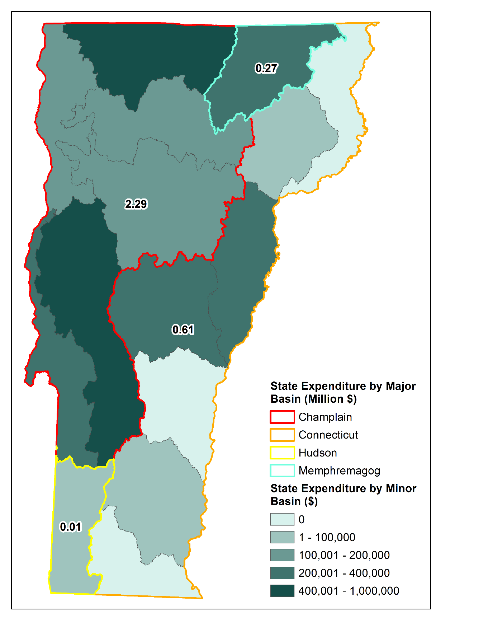By Nina Gage, VT Agency of Agriculture, Food & Markets 
2018 has been a challenging year for farmers. Despite the difficult economic situation of the dairy industry, farmers in Vermont continue to make substantial water quality improvements from infrastructure and management changes to field agronomic practices.
The State’s 2018 fiscal year (FY2018) began July 1, 2017 and ended June 30, 2018. During this time, the Vermont Agency of Agriculture, Food and Markets (VAAFM) and partner organizations statewide have worked with many farmers across the state to plan and implement conservation practices to improve water quality.
VAAFM has a comprehensive approach working with farmers that includes inspections and enforcement to ensure compliance with state agricultural water quality regulations, but also offers a host of financial and technical assistance programs to aid farmers in improving water quality.
VAAFM regulates farms based on size, ensuring that all farms follow the RAPs, as well as MFO or LFO Permits, as applicable. Farms that are not in compliance with the RAPs or Permit requirements may receive enforcement actions. There was a total of 108 enforcement actions in FY2018 from the Agency of Agriculture.
There were a total of 675 farm water quality investigations and inspections. In addition 592 site visits were conducted by the VAAFM’s engineering and technical assistance staff to provide assistance in complying with state agricultural water quality regulations and reducing risk to water quality.
Farmers worked with Agency’s Farm Agronomic Practices (FAP) program to implement 7,162 acres of agronomic practices within FY18 such as cover cropping and manure injection. Farmers worked with the Best Management Practices (BMP) program for implementation of 87 best practices within FY18 including waste storage facilities, heavy use area protection, and clean water diversion projects.
Farmers are engaged in meeting state water quality goals and continue to find innovative strategies to implement on-farm conservation practices. Since the RAPS passed in December of 2016, Vermont farmers have acquired more than 1,000 water quality educational credit hours. VAAFM and partners have hosted more than 350 educational event opportunities statewide, with more than 15,000 total attendees at these events.
All of the VAAFM water quality financial assistance programs in FY2018 invested $3.2 million in state funds for on-farm implementation. Even more impressive, Vermont farmers invested nearly $1 million in cost-share contributions or in-kind work towards implementation of VAAFM-funded water quality improvements. The Agency also acknowledges that there are additional projects and agronomic practices implemented on farms through Federal EQIP funding, as well as, by farmers without any state or federal financial assistance.
The Agency would like to truly thank each and every farmer for continuing to steward the land of Vermont, and for making water quality a priority.
If you have further questions about technical or financial assistance, inspections or enforcement, please contact the Agency Water Quality Division at 802-828-2431.

